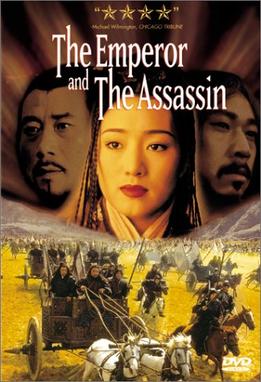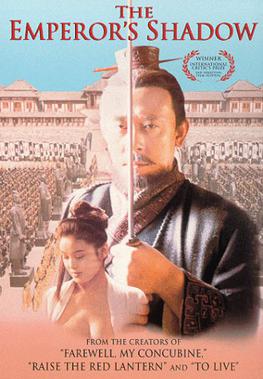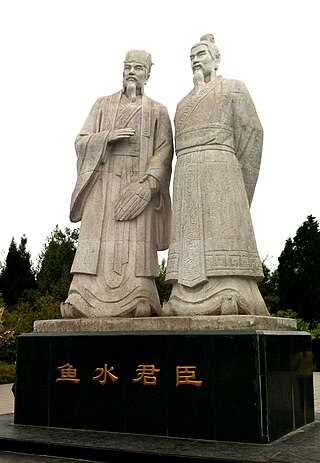Plot
In 260 BC, the Qin state inflicts a devastating defeat on the Zhao state at the Battle of Changping. A group of refugees flees from Zhao and settles down in the Lively Valley, an isolated paradise-like world. Two young men, Jing Ke and Fan Wuji, grew up in the valley with their common love interest, Ye Xiaohu. When Fan Wuji learns that his ancestral roots are actually from Qin, he leaves them and returns to his native state, where he becomes a subordinate of the infamous Qin general Bai Qi. On the other hand, Jing Ke and Ye Xiaohu travel to the Qi state and settle there. As Ye Xiaohu is tired of leading a wandering life, she leaves Jing Ke and marries a rich man, who abuses her all the time. Ye Xiaohu plots with the rich man's henchman, Nie Wuya, to kill her husband and seize his fortune, and then frame Jing Ke for the murder.
Jing Ke is arrested and almost executed, but is saved by Tian Guang, who recommends him to join an assassin organisation. Later, he becomes an apprentice of a powerful swordsman and inherits his master's legendary skills. However, as he completes more missions, he feels that he is pursuing a life that he does not want, especially after he witnesses the death of his second love interest, Yunxi. At the same time, he strikes up a close friendship with the musician Gao Jianli. Meanwhile, in the Qin state, Fan Wuji wins the favour of Ying Zheng, the King of Qin, for his distinguished service on the battlefield, but unknowingly incurs the jealousy of the chancellor Lü Buwei.
Jing Ke's adventures lead him to the Yan state, where he meets Crown Prince Dan, who requests his help in assassinating the ruthless Ying Zheng to save the other states from being conquered by the Qin state. Dan was initially held hostage in Qin, but was released by Fan Wuji. Fan Wuji, who is now denounced as a traitor by Ying Zheng, flees to Yan to join Jing Ke and Crown Prince Dan. Jing Ke accepts the mission. Fan Wuji aids him by committing suicide because Ying Zheng has already placed a high price on Fan's head for treason. Jing Ke embarks on his no-return quest, bringing along with him Fan Wuji's head and a map of Dukang with a dagger concealed inside. Jing Ke's attempt on Ying Zheng's life would be a celebrated story in Chinese history.

Qin Shi Huang was the founder of the Qin dynasty and the first emperor of China. Rather than maintain the title of "king" borne by the previous Shang and Zhou rulers, he assumed the invented title of "emperor", which would see continuous use by monarchs in China for the next two millennia.

Jing Ke was a youxia during the late Warring States period of Ancient China. As a retainer of Crown Prince Dan of the Yan state, he was infamous for his failed assassination attempt on King Zheng of the Qin state, who later became Qin Shi Huang, the Qin Dynasty's first emperor. His story is told in the chapter titled Biographies of Assassins (刺客列傳) in Sima Qian's Records of the Grand Historian.
Gao Jianli was a musician of the Chinese state of Yan, during the Warring States period, who played a struck zither called zhu or ji zhu.

The Emperor and the Assassin, also known as The First Emperor, is a 1998–1999 Chinese historical romance film based primarily on Jing Ke's assassination attempt on the King of Qin, as described in Sima Qian's Records of the Grand Historian. The film was directed by Chen Kaige and stars Gong Li, Zhang Fengyi, Li Xuejian, and Zhou Xun. The film was well received critically and won the Technical Prize at the 1999 Cannes Film Festival. It was the most expensive Chinese film made up to that time, costing US$20 million.

The Emperor's Shadow is a 1996 Chinese historical film directed by Zhou Xiaowen and starring Jiang Wen, Ge You, Xu Qing and Ge Zhijun. It was the most expensive Chinese film produced at the time of its release.

The grand chancellor, also translated as counselor-in-chief, chancellor, chief councillor, chief minister, imperial chancellor, lieutenant chancellor and prime minister, was the highest-ranking executive official in the imperial Chinese government. The term was known by many different names throughout Chinese history, and the exact extent of the powers associated with the position fluctuated greatly, even during a particular dynasty.
Huan Yi was a general of the state of Qin in the late Warring States period.

Romance of the Three Kingdoms is a Chinese television series adapted from the classical 14th century novel of the same title by Luo Guanzhong. The series was produced by China Central Television (CCTV) and was first aired on the network in 1994. It spanned a total of 84 episodes, each approximately 45 minutes long. One of the most expensive television series produced at the time, the project cost 170 million yuan. It was completed over four years and involved over 400,000 cast and crew members, including divisions of the People's Liberation Army from the Beijing, Nanjing and Chengdu military regions. Some of the dialogue spoken by characters was adapted directly from the novel. Extensive battle scenes, such as the battles of Guandu, Red Cliffs and Xiaoting, were also live-acted.

Royal Tramp is a 2008 Chinese television series adapted from Louis Cha's novel The Deer and the Cauldron. Produced by Zhang Jizhong and Huayi Brothers, the series consists of 50 episodes, filmed in high definition. The series was first broadcast on Jiangsu TV in China in 2008 and was subsequently aired on TVB in Hong Kong and other countries.

Qin's wars of unification were a series of military campaigns launched in the late 3rd century BC by the state of Qin against the other six powers remaining in China — Han, Zhao, Yan, Wei, Chu and Qi. Between 247 and 221 BC, Qin had developed into one of the most powerful of China's Seven Warring States that coalesced in the wake of the Zhou dynasty's decline, by now retaining a weak and merely ceremonial position among the warring states. In 230 BC, King Ying Zheng of Qin began the sequence of campaigns that would bring the Warring States period to a close, setting out to conquer each remaining sovereign one by one. This was completed in 221 BC with the fall of Qi, leaving the former Zhou sphere unified under a more centralized Qin control. Ying Zheng declared himself the First Emperor, or Qin Shi Huang—becoming the first sovereign over a unified China under the imperial Qin dynasty.

All Men Are Brothers is a 2011 Chinese television series adapted from Shi Nai'an's 14th century novel Water Margin, one of the Four Great Classical Novels of Chinese literature. The series is directed by Kuk Kwok-leung and features cast members from mainland China, Taiwan and Hong Kong. The series was first broadcast on 8TV in March 2011 in Malaysia.

The Shaolin Warriors is a Chinese television series directed by Raymond Lee, starring Sammo Hung, Cui Lin, Christopher Lee, Jeanette Aw, Sammy Hung, Cui Peng, Liu Ying and Li Man. The series was first broadcast in November 2008 on CCTV-8 in mainland China. It is the first wuxia television series to filmed in direct collaboration with Shaolin Monastery and features some rarely seen martial arts techniques.

Justice Bao is a Chinese TV series starring producer Jin Chao-chun as the Song dynasty official Bao Zheng. The series ran for 3 seasons from 2010 to 2012. In addition to Jin, Kenny Ho, Fan Hung-hsuan and Lung Lung again reprise their iconic roles from the 1993 Taiwanese hit Justice Pao and the 2008 Chinese series Justice Bao.

Wu Zi Bei Ge, also known as Wu Zi Bei Ge: Wu Zetian Zhuan, is a 2006 Chinese television series based on the life of Wu Zetian, the only woman in Chinese history to assume the title of "Empress Regnant". The series was directed and written by Chen Yanmin, and starred Siqin Gaowa and Wen Zhengrong as the empress. The series' title Wu Zi Bei Ge literally means "Song of the Uncharactered Stele", with the "stele" referring to the unmarked one standing near Wu Zetian's tomb at the Qianling Mausoleum.
Li Xin (李信), courtesy name Youcheng (有成), was a Chinese military general of Qin during the Warring States era. Alongside Wang Jian, Wang Ben and other generals, Li Xin served under Qin Shi Huang in his conquest of the six Warring States. He is also the great-great-grandfather of Li Guang, a Han dynasty general.

The King's Woman is a 2017 Chinese television series starring Dilraba Dilmurat and Vin Zhang. It is adapted from the novel The Legend of Qin: Li Ji Story (秦时明月之丽姬传). The series aired on Zhejiang TV every Monday to Wednesday, from 14 August to 4 October 2017.

The Qin Empire II: Alliance is a 2012 Chinese television series adapted from Sun Haohui's novel of the same Chinese title, which romanticises the events in China during the Warring States period primarily from the perspective of the Qin state during the reigns of King Huiwen and King Wu.

The Qin Empire III is a 2017 Chinese television series based on Sun Haohui's novel of the same Chinese title, which romanticizes the events in China during the Warring States period primarily from the perspective of the Qin state under King Zhaoxiang. It was first aired on CCTV-1 in mainland China in 2017. It was preceded by The Qin Empire (2009) and The Qin Empire II: Alliance (2012) and followed by The Qin Empire IV (2019), which were also based on Sun Haohui's novels.

Word Of Honor, previously titled A Tale of the Wanderers (天涯客), is a 2021 Chinese costume streaming television series co-produced by Ciwen Media, and Youku, directed by Cheng Zhi Chao, Ma Hua Gan, and Li Hong Yu, written by Xiao Chu, adapted from the danmei novel "Faraway Wanderers" (天涯客) by Priest. It starred Zhang Zhehan and Gong Jun in the leading roles. The series aired on Youku from February 22 to May 5 with 36 episodes, plus a short bonus clip shows what happened after the end of the main series.
















